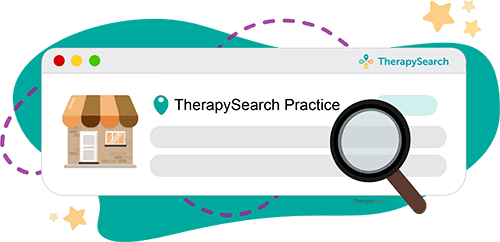How to Grow Your Practice With Your Therapy Website
By Becky DeGrossa on July 24, 2019

Many passionate therapists struggle to get their practice off the ground and fill it with clients—not because they are bad therapists but because they aren’t getting enough web traffic.
Running a practice is a full-time job, and with so many steps requiring your attention, nurturing your therapy website can seem like a secondary concern. But when you don't pay ample attention to your website, you’re more likely to overlook important steps that can help you get noticed.
With that in mind, here are 5 online marketing tips to get more business.
1. Delegate
If you pour hours every day into building a website, that means less time to see clients. But if you wait until you get home to do that marketing work, it can leave you too busy or exhausted to sit back, relax, and enjoy time with your family.
If you don’t take care of yourself, you won’t be able to keep up with day-to-day operations. But the thought of spending hundreds or thousands of dollars on marketing services can be intimidating, especially when you already feel like you're stretched too thin.
One option is to outsource your marketing work to an employee or a firm who has the ability to dedicate time to marketing and has the bandwidth to research and discover effective marketing strategies. According to a study by McMurry/TMG, content marketing leaders (those investing in new and proven strategies) see yearly site traffic increase 7.8 times more than content followers (those who adopt strategies only when it becomes the standard).
2. Know Who You Are Trying to Reach
Many businesses focus so much on their product or service that they forget about the clients they serve. To get the most out of your marketing efforts, you need to know who you’re targeting. Consider:
- How do they search for help online?
- Where do they spend time (both online and locally)?
- What problems and goals do they have?
- Are those the same problems and goals you think they have?
You can identify your audience by creating what’s known as an Audience Avatar. Define your audience for your practice as a whole (location, demographics, finances) as well as each specialty (age range, individuals or couples, unique challenges and goals). When you know who your ideal clients are, you’ll know what help they need, what questions they have, and how to reach them online.
3. Know What Sets You Apart
The market for therapy, even specialized therapy, can quickly become saturated, especially in or around big cities. Consider, for example, that there are over 42,000 marriage and family therapists, not including self-employed workers, in the US. Because there’s so much competition, it’s important to know what makes you stand out and how to show that to potential clients.
Knowing your unique selling point allows you to highlight aspects of your practice and approach that competitors can’t. For example, Hulu knows its ability to offer new episodes and live TV sets it apart from Netflix, so that offer is clearly called out in many of their marketing efforts.
What differentiates you from competitors? For example:
- Do you see children and parents?
- Do you help couples even if they are sure they want to get a divorce?
- Do you use a new or less common treatment modality?
- Do you offer retreats?
It all boils down to why clients choose you over a competitor and making that point clearly on your therapy site.
4. Gather and Analyze Data
No matter how successful a business or private therapy practice is in the short term, its ongoing success depends on one thing: data.
You need to know what is and isn’t working for your business so you can continue to grow your practice, reduce costs, and establish more efficient business operations. More than that, using data gives you an immediate competitive edge. Despite the importance of data in making the best business decisions, 64% of companies DON’T have a content strategy report.
Let’s say you started a blog and simultaneously started using paid Google ads for your private practice in January. In April, you see your website traffic is up 70%—but what was the cause? Without the right data, you might continue to pour money into a strategy that isn’t working while ignoring a strategy that was driving positive growth.
The data you gather will depend on your strategy, but here are a few key metrics to keep an eye on:
- Traffic (how many people visit your site)
- Keywords/page ranks (what pages and key search terms are bringing in the most traffic)
- Bounce rate (are people staying on your site, or do they leave right away, meaning they didn’t find what they were looking for)
- Conversions (how many people are actually calling after visiting your site)
5. Set Goals (and Celebrate Wins)
Many therapists and business owners give up on effective marketing strategies if they don’t show immediate results, but some results can take weeks or months to fully materialize. Setting clear goals gives your private practice marketing efforts a clear direction and timeline, so you can better understand what is and isn’t working.
Are you trying to get more people onto your website? Are you happy with traffic numbers but want to improve conversion rate? Are you trying to expand your practice to a new location?
Private practice marketing can be stressful, so make sure you take time to celebrate each win.
The Business of Growing Your Practice
By paying attention to how you present your business online, you can gain new clients, drive rapid growth, and reduce operational stress that may be keeping you from giving clients your best.
Ready? Set? Grow!
* The content of this post is intended to serve as general advice and information. It is not to be taken as legal advice and may not account for all rules and regulations in every jurisdiction. For legal advice, please contact an attorney.
About Becky DeGrossa
Get more content like this, delivered right to your inbox. Subscribe to our newsletter.
More Content You'll Enjoy

Converting Clients

What's New: Introducing Practice Profiles in TherapySearch!
